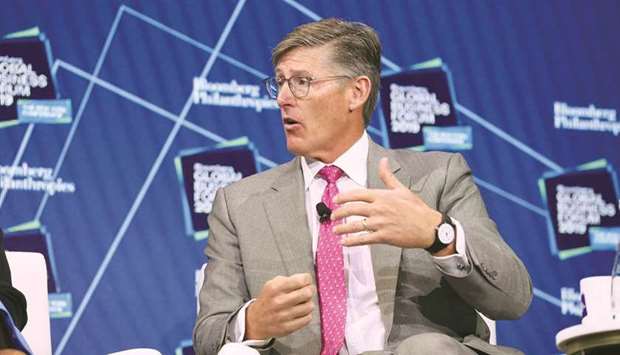Citigroup Inc’s Michael Corbat warned that the world of banking is quickly changing in his final message as chief executive officer to the bank’s hundreds of thousands of employees.
Corbat, who will be succeeded by Jane Fraser on today, said customers are increasingly looking for financial services to be more personalised and delivered in a faster and simpler way.
A decade after the financial crisis, the chiefs of the largest US banks faced a grilling from lawmakers on everything from income inequality to their ties to politically controversial industries.
“As I pass the reins to Jane, I can confidently say that this 208-year-old institution has its best days ahead,” Corbat said in a memo to staff. “I cannot wait to see how Citi helps shape this new world.”
Corbat, 60, reflected on the morning 38 years ago when he was headed to an interview for the training programme at Salomon Brothers, one of Citigroup’s predecessor firms.
“I woke up to catch a flight to New York City, only to discover that my car had been stolen,” Corbat said in the memo, noting he eventually made his way to New York and was offered a spot in the prestigious programme. “Not exactly an auspicious beginning to my career.”
The bank has been investing in its wholesale business in Brazil to take advantage of project-finance deals, mergers and acquisitions, and capital-markets offerings.
He spent decades climbing Citigroup’s ranks with stops as head of the franchise in Europe, the Middle East and Africa, and a stint overseeing the unit that housed assets marked for sale in the aftermath of the financial crisis. He was named CEO in 2012.
“I have loved every job I’ve had at Citi,” Corbat said. “But serving as your CEO has been the honor of a lifetime.”
Corbat’s departure comes as the bank is facing fresh scrutiny from regulators about its underlying technology and internal controls, work that will continue on Fraser’s watch.
She’s also taking over as the world continues to grapple with the deadly coronavirus pandemic, hindering economic growth and sending unemployment soaring. That’s meant the bank has had to set aside more in reserves to cover potentially souring loans, pressuring profits. Still, it’s a far cry from the firm’s performance during the financial crisis, when Citigroup drew a larger bailout than any other US bank and was forced to sell almost $1tn of subprime assets and exit dozens of businesses.
“Think about how far this bank has come over the last decade,” Susan Katzke, an analyst at Credit Suisse Group AG, said on Thursday at a virtual conference.
During his tenure as CEO, Corbat became known for taking daring stances on social issues. The firm was the first major company to offer a frank assessment of the difference in wages it pays to men and women and remains one of the few companies to continue to do so today.
And when outcry over gun violence engulfed the US in 2018, Corbat announced the bank would prohibit retailers that are customers of the firm from offering bump stocks or selling firearms to people who haven’t passed a background check or are younger than 21.
“As CEO, I’ve been determined to keep our mission and purpose front and centre,” Corbat said in his parting memo. “As a global bank, we must never forget the tremendous influence Citi can have on society.”

Michael Corbat, CEO of Citigroup, speaks during the Bloomberg Global Business Forum in New York. Corbat’s departure comes as Citigroup is facing fresh scrutiny from regulators about its underlying technology and internal controls, work that will continue on Fraser’s watch.
